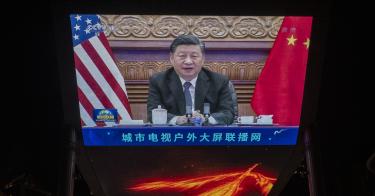President Biden can keep the dust-up between Beijing and Taipei from triggering World War III. All he has to do is follow the law. That might sound like an easy fix, but it might be hard for this president, who has a penchant for ignoring laws. This unfortunate proclivity is evidenced in areas as disparate as immigration and border security to rent moratoria.
But a week of unprecedented Chinese military overflights of Taiwan’s designated air defense zone may be enough to shake him from this bad habit. The sheer number of overflights–some 150 and counting–is highly provocative. And intentionally so.
The overflights are nothing new. They have been part of Beijing’s strategy of intimidation for years. In 2020, China flew 380 military incursions into the Taiwanese defense zone.
The flurry of flights in the last week certainly constitutes a worrying change of pace. But does it portend a change in Beijing’s strategy or, worse, a prelude to war? Probably not.
>>> A Democratic Ally, Taiwan Merits Greater Trade With U.S., Europe
Here is why. There is little evidence that China’s fundamental global strategy has changed. Following the playbook of ancient military philosopher Sun Tzu, Beijing would prefer to “win without fighting.” The recent aggressive display of military airpower is probably best interpreted as an in-your-face warning to Taiwan and the U.S. not even to think about future political action supportive of independence.
From Beijing’s perspective, this demonstration also may leave a salubrious political impression on Taiwan. A more compliant, China-friendly government is not out of the question in the next few years. Beijing will no doubt keep up the pressure, hoping to prompt the Taiwanese to rethink their options.
Why now? Only Beijing knows for sure. The uptick in flights began Oct. 1, the anniversary of the founding of the People’s Republic of China. But four consecutive days of aerial parading is far more than you’d expect from even the most exuberant birthday celebration.
Clearly other factors are at play. After his Afghan debacle, Biden tried to bolster sagging American street cred in the Indo-Pacific by signing the nuclear submarine deal with Australia and the United Kingdom, as well as hosting the other leaders of the Quad (Australia, Japan and India). The Taiwan dust-up is a nice little counter punch from Beijing, reminding the region that it can move and shake the earth whenever it wants.
Beijing may also anticipate other benefits from stepping up the overflights. If they keep up the pace, it will normalize the incursions to the point where the world sees them as mundane, much in the way China muscled into the South China Seas.
These exercises offer an opportunity to practice large-package operations—planning, marshaling and executing a simulated coordinated attack. They also give China the chance to test and assess Taiwan’s ability to respond.
China has long viewed the U.S. as a nation in decline, and the bungled withdrawal from Afghanistan only confirmed this conviction. Washington’s response to the Beijing air show–a “strongly worded” letter and an ambivalent phone call from Biden–did nothing to dispel that notion.
Beijing thinks it has Biden’s number, and strangely enough, this actually makes an invasion scenario less likely. It encourages China to stick with its "winning without fighting" strategy. After all, why chance a bloody battle when you just have to hold on and wait for your target to fall into your lap?
>>> Yes, China Could Invade Taiwan
That’s not to say that Biden’s milquetoast response was optimal. He could have sent Beijing a back-off message the Chinese Communist Party would understand by directing a proportional military demonstration. That would have cost Beijing face, without ramping up the possibility of a military clash. Sadly, that’s not the president we have.
Still, there is an easy fix for Biden—one that would enjoy bipartisan support in Congress and one that Beijing would understand. The president could lean in on following the letter of the law in the Taiwan Relations Act. That legislation gives Biden all the backbone he needs to demonstrate that the U.S. will not stand idly by and let Beijing do to Taiwan what it did to Hong Kong.
So far, the administration’s policies on Taiwan have been generally constructive, but the U.S. response to the overflights has been minimalist and likely inadequate. Biden can make up for that by committing to strong U.S. support of Taiwan for the long haul and by encouraging our allies–and particularly the Quad partners–to do likewise.
This piece originally appeared in The Hill 10/07/21




